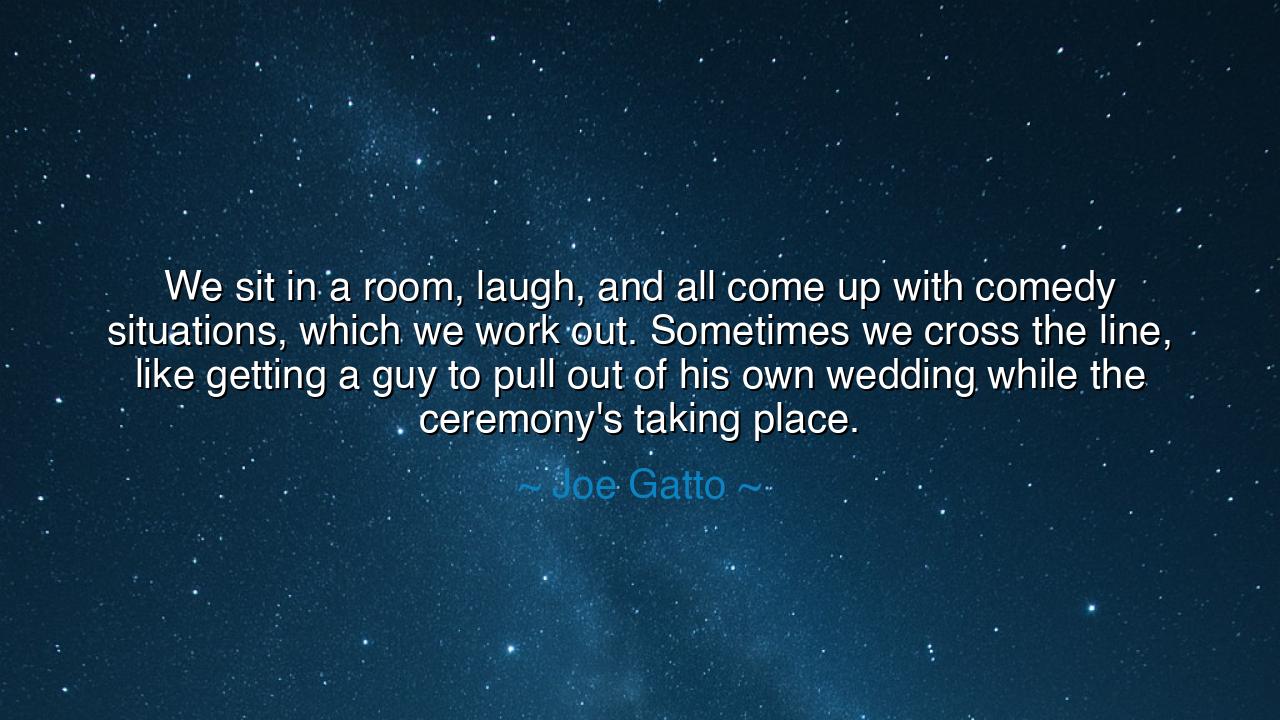
We sit in a room, laugh, and all come up with comedy situations
We sit in a room, laugh, and all come up with comedy situations, which we work out. Sometimes we cross the line, like getting a guy to pull out of his own wedding while the ceremony's taking place.






Listen well, O seekers of mirth and insight, to the words of Joe Gatto, who speaks of the sacred alchemy of laughter, the hallowed space where companions gather to weave the ephemeral into the eternal. In this telling, the room becomes a temple of creativity, where laughter and imagination are the instruments of discovery. Here, ideas are born not from solitude, but from the communion of minds, each thought a spark that ignites the next, until the room itself hums with the energy of shared invention.
Yet within this joyous craft lies the shadow of boundary. Gatto admits, with the candor of one who treads close to the edge, that sometimes they cross the line. The example he gives—a man coaxed to withdraw from his own wedding—reveals the tension between play and consequence, between the delight of a jest and the weight of reality. This mirrors the ancient understanding that humor, though divine in its power to uplift, carries a dual edge, capable of both lightening hearts and unsettling lives.
Consider the jesters of old, those sacred fools who moved freely within the courts of kings. They dared to speak truths disguised as comedy, bending the rules of propriety to reveal hidden wisdom. Much like Gatto and his companions, they engaged in the delicate dance of provocation, testing limits while evoking laughter that carried both pleasure and caution. Their laughter was not mere frivolity—it was a lens through which human folly and human virtue were revealed.
In the modern world, we find echoes of this daring spirit in the antics of Charlie Chaplin, whose films balanced mischief with moral insight, showing the absurdity of society while inviting reflection. Gatto’s room, filled with collaboration and audacious ideas, continues this lineage: the act of creating comedy is both joyful and perilous, requiring trust, timing, and the wisdom to know when to pull back from the brink.
Thus, O observers of life, let the teaching sink into your bones: true creativity arises not from caution alone, but from risk and the embrace of shared energy. To sit in a room with kindred spirits, to laugh, to imagine, to push boundaries, is to touch the edge of something greater than oneself—a fleeting glimpse of the divine interplay of joy, risk, and wisdom.
Remember this, as the ancients would counsel: the laughter that stirs the soul is forged in camaraderie, tempered by insight, and guided by the awareness that while comedy can transgress, it can also illuminate the truths hidden in the hearts of men. Let all who heed this teaching honor both the lightness of humor and the gravity of its consequences.






LGLong Gia
Joe Gatto’s approach to comedy seems to be about taking risks, but I wonder if there’s a moral dilemma when it comes to pushing the boundaries. It’s one thing to be funny, but it’s another to interfere with someone’s personal life for the sake of humor. How do you think people should handle humor that involves real-life situations? Can comedy ever justify crossing into deeply personal moments like weddings?
GAgoogle anh
This is an interesting take on comedy, where the focus is on creating situations that challenge what is acceptable. But do you think jokes like the one Joe mentions about a wedding are more about the shock factor than genuine comedy? Is it possible to have comedy without crossing those lines, or is that exactly what makes it funny? I wonder how the audience reacts to these kinds of pranks – does everyone always laugh, or is there discomfort?
ULTu Uyen Le
It’s great that Joe and his team can come up with creative scenarios that push the envelope, but I can't help but question – how does this kind of humor affect the people involved in these pranks? What if someone is truly hurt or offended by something that was meant to be funny? Comedy is meant to entertain, but should there be more consideration given to the impact of these kinds of stunts on real people?
HN12x4 Hai Nam
Joe’s comment really highlights how comedy often comes from pushing boundaries. But at what point does the joke stop being funny and start becoming problematic? I get the humor in the idea of a wedding prank, but is it possible that situations like these could actually harm relationships? How do comedians or pranksters ensure they don’t cross into territory where humor is more hurtful than helpful?
HNHai Huy Ngo
It’s interesting how Joe describes the process of creating comedy, especially with the example of pulling a stunt during a wedding. But I’m curious, how do people actually react in such extreme scenarios? Do they laugh, or does it make them uncomfortable? There’s a fine balance between being funny and being too shocking. Can a prank like that really be funny, or does it risk causing real harm or embarrassment?